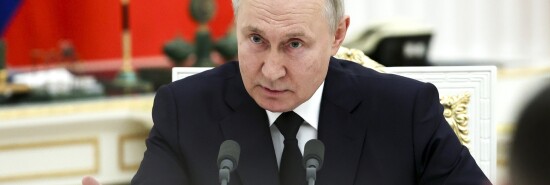
Russia’s economic decline is irreversible
James Rogan
Video Embed
The economy of Russia is in shambles. And while the war in Ukraine is the main culprit for this state of affairs, there are others. Making matters worse for Moscow, President Vladimir Putin’s choices have rendered unworkable traditional economic paths out of recession and economic stagnation.
Typically, a domestic economy operating under a sanctions regime such as that facing Russia would create substitutes for otherwise unavailable goods and services. But sanctions dramatically limit foreign direct investment, which is necessary to modernize the Russian economy. The basic nature of Putin’s economic system makes it almost impossible for Russia to crawl out of its deep economic hole. Economic and political stability, necessary preconditions for economic reform, are far over the horizon given the war in Ukraine, sanctions, and the coup attempt by Yevgeny Prigozhin.
BIDEN MAY BUCK BIPARTISAN VOTE TO KEEP MORTGAGE OVERHAUL IN PLACE
Russia lacks a diversified economy. It is heavily dependent on its oil and natural gas sector for hard currency reserves. It lacks a vibrant entrepreneurial class. Corruption and organized crime are rampant in Russia. New business, the engine of economic growth and innovation in the United States, is non-existent. Weak rule of law and excessive business regulation are endemic. Top line: Russia needs major internal economic reforms and greatly improved political stability to solve its problems.
Because small and new businesses cannot save the Russian economy from stagnation, it is left to the big state corporations to guide Russia out of its economic quagmire. That will not happen. The big state corporations are one of the central weaknesses of the Russian economy. They are inefficient, bloated, and sources of embedded corruption.
It’s worth emphasizing just how overly dependent on its oil and natural gas sectors Russia is. Before the Ukrainian war, oil and natural gas revenues constituted up to 45% of the total Russian budget. After sanctions were imposed because of the Russian invasion, oil revenues have fallen to just 23% of the Russian budget. Russia has a strong comparative advantage in the production of oil and natural gas. It is among the three largest producers of oil. Russia only trails the U.S. in the production of natural gas. It arguably possesses the world’s largest gas reserves, but over reliance makes the economy vulnerable to falls in global demand.
Another problem for Putin and Russia?
Russia under invests in its oil and gas sectors. In time, investment will hollow out this crown jewel of the Russian economy. According to the Norwegian research firm Rystad Energy, Russian investment in its oil and gas sectors will plunge by about 30% because of sanctions. Russia’s liquified natural gas sector will be especially hard hit. And Russia is absent from the industry which is described as the ‘oil’ of the 21st century, semiconductors.
CLICK HERE TO READ MORE FROM THE WASHINGTON EXAMINER
What is especially ironic about Russia’s absence from the global semiconductor industry is Russia’s history of global preeminence in mathematics and physics. Russia has the intellectual capital to be a dominant force in the semiconductor space and in artificial intelligence, but its political and economic systems preclude the development of this nascent comparative advantage.
At some point, the ruble will stop with a bang on Putin’s desk.
James Rogan is a former U.S. foreign service officer who later worked in finance and law for 30 years. He writes a daily note on finance and the economy, politics, sociology, and criminal justice.
